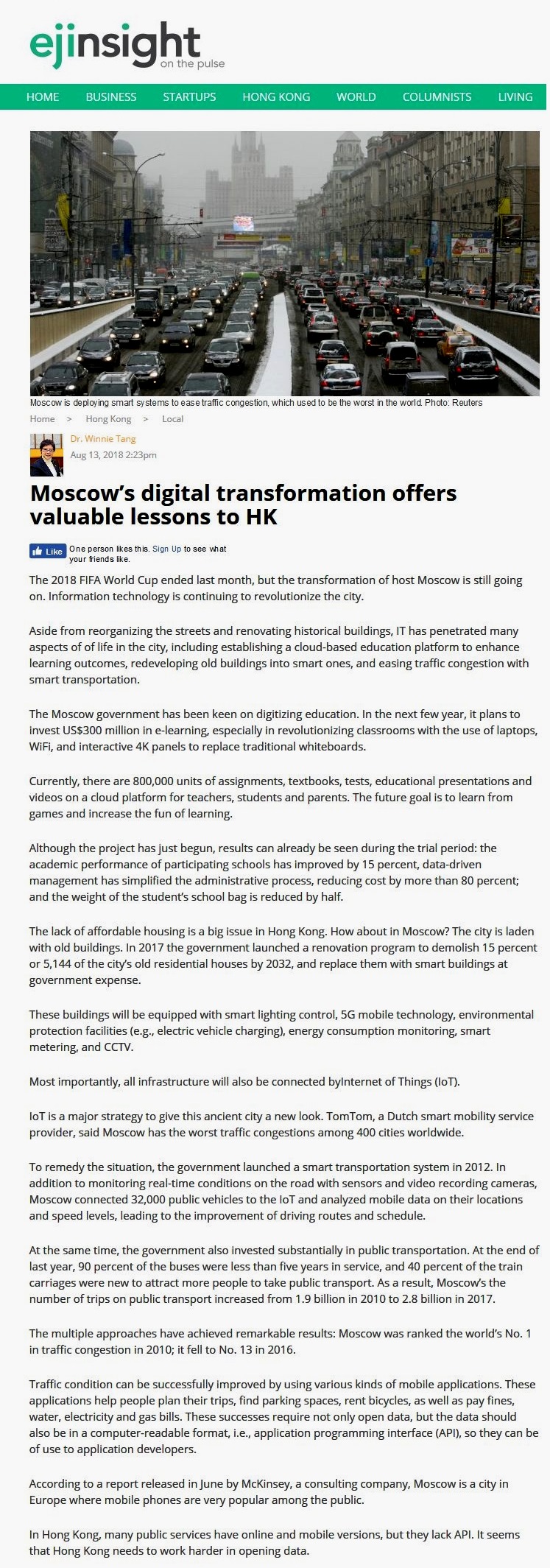網上版請按此

Moscow's digital transformation offers valuable lessons to HK
The 2018 FIFA World Cup ended last month, but the transformation of host Moscow is still going on. Information technology is continuing to revolutionize the city.
Aside from reorganizing the streets and renovating historical buildings, IT has penetrated many aspects of of life in the city, including establishing a cloud-based education platform to enhance learning outcomes, redeveloping old buildings into smart ones, and easing traffic congestion with smart transportation.
The Moscow government has been keen on digitizing education. In the next few year, it plans to invest US$300 million in e-learning, especially in revolutionizing classrooms with the use of laptops, WiFi, and interactive 4K panels to replace traditional whiteboards.
Currently, there are 800,000 units of assignments, textbooks, tests, educational presentations and videos on a cloud platform for teachers, students and parents. The future goal is to learn from games and increase the fun of learning.
Although the project has just begun, results can already be seen during the trial period: the academic performance of participating schools has improved by 15 percent, data-driven management has simplified the administrative process, reducing cost by more than 80 percent; and the weight of the student's school bag is reduced by half.
The lack of affordable housing is a big issue in Hong Kong. How about in Moscow? The city is laden with old buildings. In 2017 the government launched a renovation program to demolish 15 percent or 5,144 of the city's old residential houses by 2032, and replace them with smart buildings at government expense.
These buildings will be equipped with smart lighting control, 5G mobile technology, environmental protection facilities (e.g., electric vehicle charging), energy consumption monitoring, smart metering, and CCTV.
Most importantly, all infrastructure will also be connected by Internet of Things (IoT).
IoT is a major strategy to give this ancient city a new look. TomTom, a Dutch smart mobility service provider, said Moscow has the worst traffic congestions among 400 cities worldwide.
To remedy the situation, the government launched a smart transportation system in 2012. In addition to monitoring real-time conditions on the road with sensors and video recording cameras, Moscow connected 32,000 public vehicles to the IoT and analyzed mobile data on their locations and speed levels, leading to the improvement of driving routes and schedule.
At the same time, the government also invested substantially in public transportation. At the end of last year, 90 percent of the buses were less than five years in service, and 40 percent of the train carriages were new to attract more people to take public transport. As a result, Moscow's the number of trips on public transport increased from 1.9 billion in 2010 to 2.8 billion in 2017.
The multiple approaches have achieved remarkable results: Moscow was ranked the world's No. 1 in traffic congestion in 2010; it fell to No. 13 in 2016.
Traffic condition can be successfully improved by using various kinds of mobile applications. These applications help people plan their trips, find parking spaces, rent bicycles, as well as pay fines, water, electricity and gas bills. These successes require not only open data, but the data should also be in a computer-readable format, i.e., application programming interface (API), so they can be of use to application developers.
According to a report released in June by McKinsey, a consulting company, Moscow is a city in Europe where mobile phones are very popular among the public.
In Hong Kong, many public services have online and mobile versions, but they lack API. It seems that Hong Kong needs to work harder in opening data.
Dr. Winnie Tang
Honorary Professor, Department of Computer Science, The University of Hong Kong